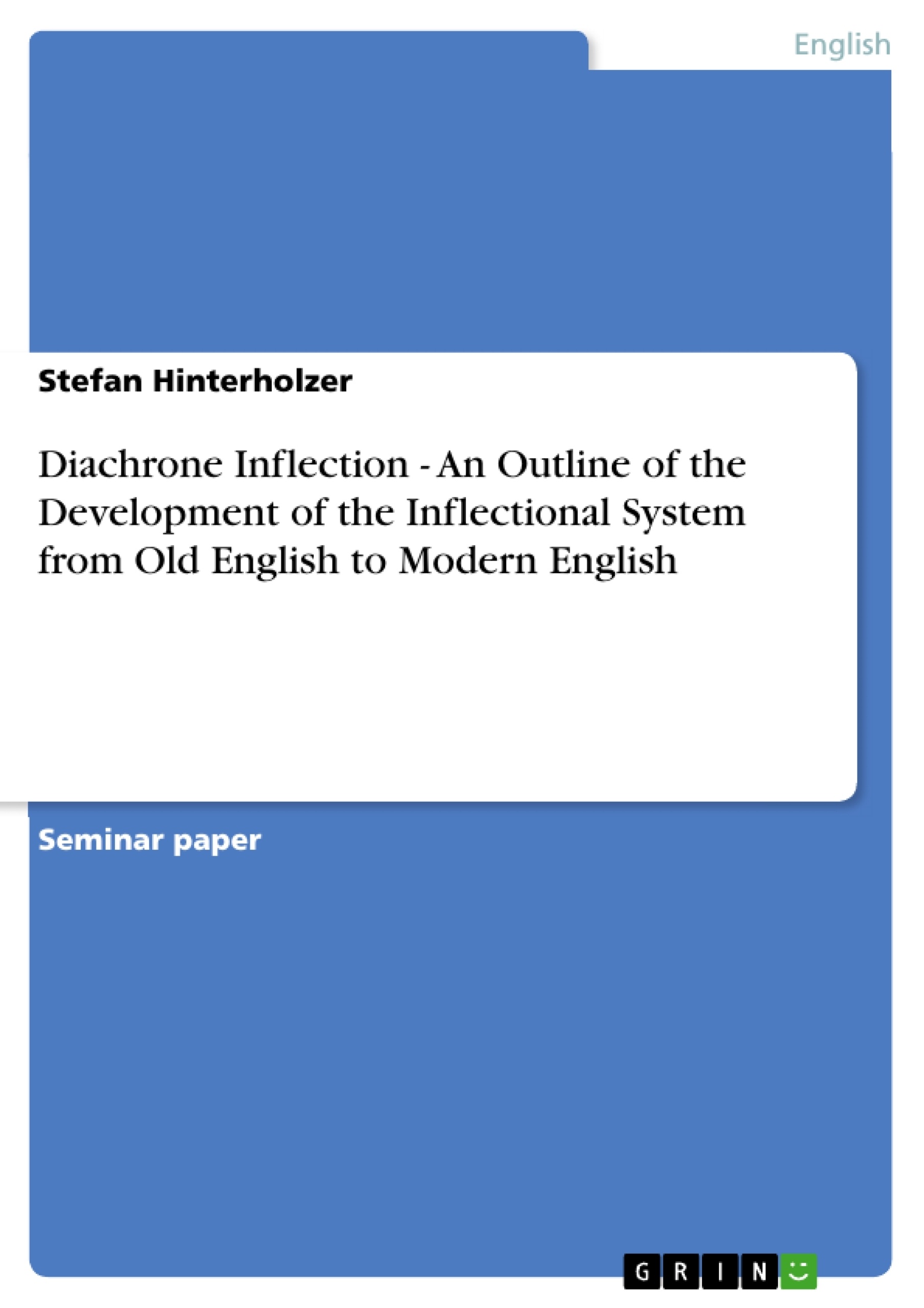Diachrone analyses of a language analyze the state of a language at different periods of time or its development throughout time.
Today English is a language that is almost uninflected, but this has not always been the case. The Old English language had many inflectional distinctions, which got almost totally lost throughout time.
In this research paper I will show the different states of the inflectional system in the Old, Middle, Early Modern and Modern English. Furthermore, there will be shown and clarified the dramatic loss of inflectional distinctions in the English language.
The tables in this research paper are partly adapted from books, partly slightly modified and partly created on my own by summarizing information of texts or results of this research paper in a table.
Inhaltsverzeichnis (Table of Contents)
- Diachrone Inflection
- Old English
- Nouns
- Case and gender
- Noun declension of nouns with vowel stems
- Noun declension of nouns with consonant stems
- Forms of the definite article “the”
- Adjectives
- Adjectival declension of adjectives modifying masculine nouns
- Adjectival declension of adjectives modifying feminine nouns
- Adjectival declension of adjectives modifying neuter nouns
- Comparative and superlative
- Personal pronouns
- Verbs
- Present conjugation: indicative and subjunctive
- Conjugation of weak verbs
- Conjugation of strong verbs
- Preterite conjugations
- Nouns
- Middle English
- Nouns
- Adjectives
- Personal Pronouns
- Verbs
- Present conjugations: indicative and subjunctive
- Preterite conjugations
- Early Modern English
- Modern English
- Summary
Zielsetzung und Themenschwerpunkte (Objectives and Key Themes)
This research paper provides an outline of the development of the inflectional system in the English language from Old English to Modern English. The paper focuses on the different states of the inflectional system in each period and aims to demonstrate the dramatic loss of inflectional distinctions over time.
- The evolution of inflectional systems in English
- The loss of inflectional distinctions
- Grammatical features of nouns, adjectives, pronouns, and verbs
- The declension of nouns, adjectives, and pronouns
- The conjugation of verbs
Zusammenfassung der Kapitel (Chapter Summaries)
Chapter 2 examines the inflectional system of Old English, highlighting its extensive use of morphs carrying multiple grammatical information. This chapter delves into the declension of nouns, adjectives, and pronouns, as well as the conjugation of verbs, with a particular focus on case and gender distinctions in noun declension.
Chapter 3 focuses on the inflectional system of Middle English, highlighting the significant changes and reductions compared to Old English. It examines the declension of nouns, adjectives, and pronouns, as well as the conjugation of verbs, discussing the ongoing simplification of the inflectional system.
Chapter 4 examines the inflectional system of Early Modern English, continuing to explore the ongoing reduction and simplification of inflectional distinctions in the language. The chapter discusses the declension of nouns, adjectives, and pronouns, as well as the conjugation of verbs, highlighting the further development of the modern English system.
Schlüsselwörter (Keywords)
Diachrone inflection, Old English, Middle English, Early Modern English, Modern English, inflectional distinctions, noun declension, adjective declension, pronoun declension, verb conjugation, case, gender, number, mood, tense.
Frequently Asked Questions
What is the main focus of the research paper on diachrone inflection?
The paper outlines the development and dramatic loss of the inflectional system in the English language from Old English to Modern English.
How did the inflectional system of Old English differ from Modern English?
Old English had many inflectional distinctions (case, gender, complex verb conjugations), which have been almost entirely lost over time.
What grammatical features are analyzed in the periods of English?
The analysis covers nouns (declension, case, gender), adjectives, personal pronouns, and verb conjugations (strong vs. weak verbs).
What changes occurred during the Middle English period?
The Middle English period saw significant reductions and simplifications in noun declensions and verb conjugations compared to Old English.
What does "diachrone analysis" mean in this context?
It refers to analyzing the state of a language at different periods of time to track its historical development and evolution.
- Arbeit zitieren
- Stefan Hinterholzer (Autor:in), 2006, Diachrone Inflection - An Outline of the Development of the Inflectional System from Old English to Modern English, München, GRIN Verlag, https://www.hausarbeiten.de/document/65852


